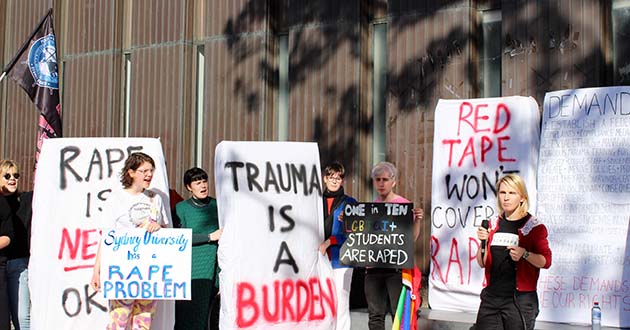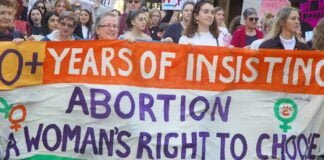Australia’s universities are fostering an environment where sexual assault and harassment are commonplace, a new Human Rights Commission report shows.
The shocking findings, based on a survey of 30,000 students and submissions from 1849 others, found that 51 per cent of students were sexually harassed on at least one occasion in 2016. Twenty six per cent were harassed in a university setting and 1.6 per cent were sexually assaulted in a university setting.
Women were three times as likely to be assaulted, and trans and gender diverse students reported disproportionate levels of harassment in particular.
Old boys club
Though the report obscures this fact, it is Australia’s top universities and their residential colleges that are bastions of sexual assault. At Australian National University (ANU) in Canberra, one of Australia’s top institutions, where most students live in residence, students are twice as likely to be sexually assaulted.
Students living in residential colleges are the most likely to be assaulted and most assaults occurred at social events at university or in residences, on university grounds, or in the residences themselves.
The younger brother of the NSW Treasurer was recently charged with rape at a St John’s college after party at Sydney University. In court, his lawyer accused the victim of lying and asking her friends to “inflict … red marks” on her in order to accuse him of rape. He was acquitted.
Colleges have been more than reluctant to address the issue, and university administrations, concerned about upsetting the moneyed elite connected to them, have dragged their heels on challenging this.
Sydney University’s notorious St Paul’s College tried to boycott a major review into sexual assault at the university’s colleges run by former Sex Discrimination Commissioner Elizabeth Broderick. Earlier this year it said it would, “not be involved in the Broderick Cultural Renewal Project”.
It follows a long history of scandal at St Paul’s, where a “pro-rape” Facebook page was set up in 2009. It was forced to back down in June following media reporting on a Facebook post by a St Paul’s student who referred to women as “harpooned whales” and wished other students “Happy slaying”.
The College’s warden, Ivan Head, responded by warning students to be careful of such comments because it might affect their job prospects. Head has since retired in disgrace.
Also this year, students at Sydney University’s Wesley College printed “slut-shaming” lists of women who had allegedly slept with the most people.
According to the Sydney Morning Herald, business leaders with links to the colleges’ ruling bodies tried their best to undermine the review.
Sexist society
Very few students reported their assault or harassment to authorities, and only 4 per cent believed universities were doing enough to prevent abuse. It’s an accurate perception. There are few consistent systems to deal with complaints, and the processes can be difficult, traumatic and non-transparent.
One submission to the report revealed that a student who was raped by three class members, and reported this to the university, was then enrolled in a class with two of the perpetrators.
It’s not just university administrations that turn a blind eye to sexual assault and harassment, but society as a whole. Many of the “old boys” of colleges like St Paul’s join the privileged elite at banks, corporations and in politics.
The report suggests that things like “alcohol” and “easy access to residences” are “contributing factors”. But the real question it fails to address is why the victims of assault—predominantly women—are seen as less than human by their perpetrators and by society.
This culture of sexist impunity at universities mirrors that of the football codes, the Australian Defence Force, and private schools. Courts rarely convict in cases of sexual assault, and it is still legal in some Australian states to discuss a victim’s sexual history in court.
We live in a deeply sexist society that pays women less than men, still entrenches women as primary carers in the home, that sexualises women’s bodies to sell products, and that commodifies sex and sexuality.
A 2014 National Community Attitudes Survey found that Australian attitudes to sexual assault have worsened, with 43 per cent of respondents believing the sexist myth that men rape because of uncontrolled sexual urges, one in three saying women often led men on and invited assault, and one in six saying that a woman could mean yes when she says no.
As well as demanding change at universities, we must fight the structural sexism that reproduces such horrors.
By Amy Thomas






